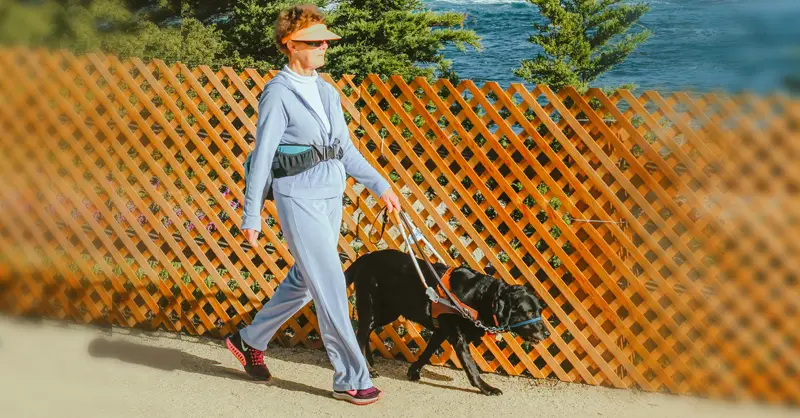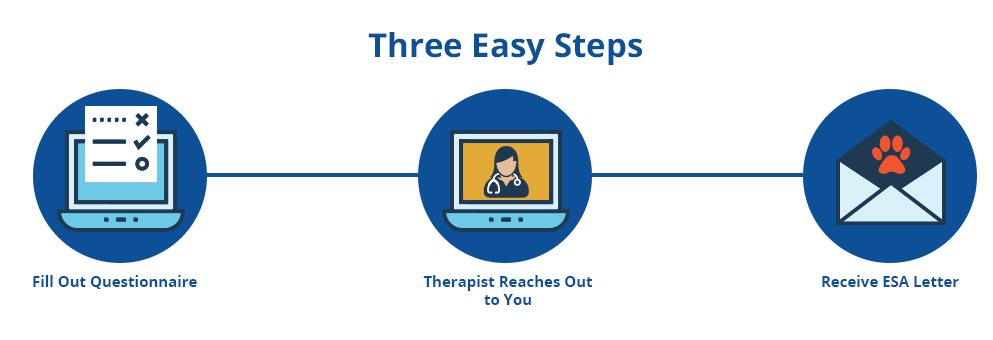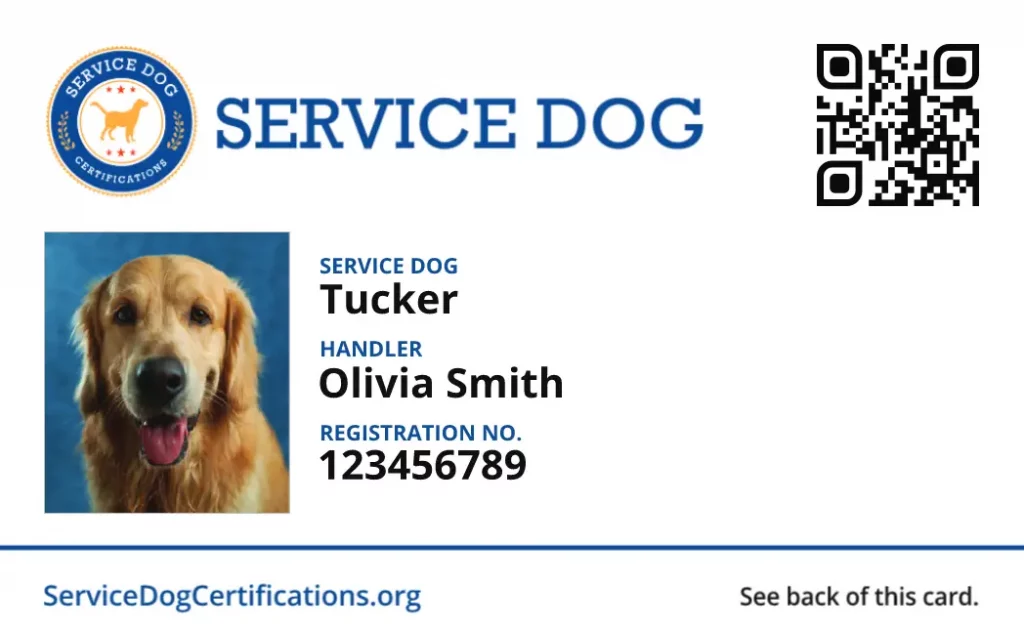Home Page › Blog › California Service Dog Requirements
California Service Dog Requirements

California allows people with disabilities to live, travel, and go about their daily lives in the presence of a service dog. Service dogs are afforded certain rights in the State of California that allow them to access public spaces that normally don’t allow pets.
Californians are protected by both federal and state laws, including under the Americans with Disabilities Act (ADA) as well as California’s Unruh Act (Civil Code, sections 51–51.2) and Disabled Persons Act (Civil Code, sections 54–55.32).
Read on for more information on California Service Dog requirements and regulations.
Definition of a service dog
Service Dog: Any canine trained to perform a disability-specific task for a person with a physical or psychiatric disability.
Service dogs used for mental health conditions are known as Psychiatric Service Dogs.
What is a disability: For legal purposes, disability is defined as a physical or mental impairment that substantially limits a major life activity (such as the ability to work, socialize, or attend school). Physical disabilities include health issues like limited mobility, visual impairment, seizures, and hearing loss. Qualifying psychiatric conditions include debilitating depression, chronic anxiety, PTSD, autism, and learning disabilities, among others.
How is a service dog trained?
To be considered a service animal, a dog must be individually trained to perform a job or task-specific to the handler’s disability.
Federal vs California rules: One difference between California’s rules and the ADA is that service dogs in training are not covered under the ADA. However, under the California Disabled Persons Act, individuals who train service dogs can bring their animals to any public place in order to train the dog and provide a disability-related service.
Who can train a dog: Dogs can be trained by the person with the disability, by a professional trainer, or with the help of a training organization. Note that in California, it is perfectly acceptable for a handler to train a service dog on their own.
Identification requirements for service dogs in California
Visible identification: Most service dog owners use service dog paraphernalia like ID cards, vests, tags, and certificates to signal to others in public that their dog is special. It is not mandatory either under California or federal rules to have an identification card or vest on your Service Dog, but handlers frequently use them for personal convenience. These items can prevent intrusive inquiries and unwanted interaction with the service animal while on duty.
Disability verification: Staff at venues and landlords cannot demand documentation as a condition of entry. In California, they can ask two questions to validate whether you have a service dog (and only if the disability is not obvious):
1. Is the animal a service dog required for a disability?
2. What work or task has the service dog been trained to perform?
Service dog registration in California
California does not require the registration of service dogs. There may be registration requirements that generally apply to all dogs that reside in your area, but they are not service-dog specific. Service dog owners, however, choose to voluntarily register their dogs for several reasons.
What it’s for: Registering a service dog with a service like Service Dog Certifications enters the dog’s information into a searchable database linked to an ID card. The ID card can be used as one way to signal to others that you own a service dog or be presented when third parties unaware of service dog verification rules continually insist on seeing documentation.
Psychiatric service dog requirements
Psychiatric service dogs are recognized as service dogs in California with all the same rights and benefits of ownership.
Psychiatric service dogs are still not well appreciated by the general public but are a growing category of assistance animals.
California considers the following as psychiatric disabilities if they substantially limit a major life activity:
- Post-Traumatic Stress Disorder
- Anxiety Disorders
- Depression
- Obsessive-Compulsive Disorders
- Personality Disorders
- Schizophrenia and Schizoaffective Disorder
- ADHD
- Autism
Psychiatric service dogs can perform an amazing number of tasks, including:
- Deep pressure therapy
- Reminding the owner to take medication
- Posting and watching the owner’s back in open areas
- Tactile stimulation
- Alerting the owner to oncoming threats or episodes
- Disrupting repetitive self-destructive behaviors
Service dog vs emotional support dog in California
California also recognizes emotional support animals as a type of assistance animal. An emotional support animal (ESA) alleviates symptoms of a mental or emotional health condition.
SD vs ESA: There are major differences between ESAs and service dogs.
- ESAs do not require any specialized training.
- ESAs are protected under the Fair Housing Act, not the ADA, so the benefits extend primarily to housing rights and do not come with public access rights.
- While service dogs can only be dogs, ESAs can be dogs, cats, birds, gerbils, fish, turtles, and other small household pets.
To qualify for an emotional support animal in California, you need an ESA letter from a California-licensed mental health professional. See if you qualify for an emotional support animal letter by completing the online questionnaire below.

You and your service dog in California
Service Dog handlers in California have generous rights. These include:
- Public access (venues, outdoor areas, etc.)
- Access to public transportation
- Access to aviation (including in the cabin on airplanes)
Having a service dog in California is a major responsibility. Properly training a service dog can be challenging, and service dog owners are expected to have their animals under control at all times. Of course, as a reminder, California law prohibits misrepresenting a pet dog as a service dog.
As a service dog owner, it’s important to be aware of your rights and how to conduct yourself during proper service dog verification requests by third parties. Registrations, certificates, ID cards, tags, and vests can’t replace these procedures, but they can help ease the process and give the public an easy way to recognize your companion as a service dog.
About the Author: The writing team at Service Dog Certifications is made up of folks who really know their stuff when it comes to disability laws and assistance animals. Many of our writers and editors have service dogs themselves and share insights from their own experiences. All of us have a passion for disability rights and animals.
Latest Posts

How to Bring a Service Dog to Disneyland
Trained service dogs are more than welcome to join their handlers at Disneyland. In this guide, we’ll explain Disneyland’s policies and give practical advice for bringing a service dog to Disneyland for the first time. Disneyland’s Service Dog Policies The Magic Kingdom is happy to welcome trained service dogs across most park locations! They kindly […]

Read More

Can Dogs Eat Tomatoes?
Yes! Dogs can safely enjoy tomatoes, but there are a few risks to be aware of so you can feed your dog responsibly. Fully ripe tomatoes (without the stems and leaves) can actually have nutrients that are good for your pup. Tomatoes have chlorogenic acid, an antioxidant that can have anti-inflammatory effects in cells. They’re […]

Read More

Can a Primary Care Doctor Write an ESA Letter?
Your family doctor, also called a primary care physician (PCP), can write a letter recommending an emotional support animal. We’ll explain what legally gives them that ability and explore what better options might be available for you. Why are Physicians Able to Write an ESA Letter? To turn your pet into an emotional support animal, […]

Read More









Are schools considered private property or public space? I’m asking because there was an event at a school in California where a service animal was at the door and the young volunteer at the door ask if the person had the ID card for the service dog incase the school asked for it, the owner said by law they were not allowed to ask that and the reply was schools are considered private property and under state law they were allowed to ask.
Schools are covered by the ADA, and no third party is allowed to ask to see an ID card as a condition for accommodating a service dog. The school staff is allowed to ask two questions to verify a service dog on the premises: 1. Is the dog a service dog required for a disability? and 2. What job or task has the dog been trained to perform?
They can only ask 2 questions; 1) is you animal a service animal required because of a disability. 2) what work or task has your service animal been trained to perform.
**They CAN NOT ask what the disability is, or for a performance of the task nor can they ask for documentation or require a vest or ID card or certification.
I have a 3.5 year old dog that is very smart! I have been able to train her for basic commands and to pick up things that I drop on the floor. I live in California, and I want to train her to be a service animal to help with physical support needs. I read the article, “Federal vs California rules,” and I’m wondering if this is also inclusive for work. I need to train her for specific tasks that I mostly encounter at work, so I would like to start training her in my work environment. My question is… Is a service animal in training allowed in the work place in order to train the dog and provide a disability-related service?
Yes, service dogs have rights under the ADA when it comes to the workplace. Employers must accommodate employees that need a service dog for their disability.
My housemate locks his ESA dog in a 10×10 room 22-23 hours a day…so he yelps and barks all night. House mates cannot sleep. Owner refuses to hire professional trainer. Are there regulations on how much space an animal has rights to occupy that is not cruel, and how could we procure a quiet, peaceful house at night?
If you believe any animal is being mistreated or is living in substandard conditions, we strongly advise you to contact animal services in your area. In addition, ESAs are expected to behave well in residences – they cannot create an ongoing disturbance for neighbors.
Does my ESA dog still have to have a license and if so is there a discount for one?
You do not need a license for an emotional support dog. The only documentation you need is an ESA letter from a licensed healthcare professional. If you need an ESA letter at an affordable rate, please see this link: https://www.servicedogcertifications.org/esa-letter/
Des my service dog have to be in a carrier on a plane, or can it sit at my feet?
Service dogs do not have to be in a carrier on a plane. They are allowed to sit at your feet as long as they are not obstructing the aisle or encroaching the space of another passenger. Please see this guide for more information: https://www.servicedogcertifications.org/flying-with-a-service-dog-guide/
THIS INFORMATION IS AMAZING ,I THANK YOU SO VERY MUCH.I HACE A SERVICE DOG I AM BEING DISCRIMINATED AGAINST,HARRAST,BULLIED .HUMILIATED.I LIVE IN A COMMUNITY THAT HATES DOGS.THEY ARE DOING EVERY THING THEY CAN TO GET RIDE OF HER FROM THIS COMMUNITY.I HAVE PSTD I NEED MY GIRL. ANYONE ELSE GOING THROUGH THIS OUT THERE.
Okay so I live in an apartment when I first moved in they had said I only need a certifications for my two service dogs for my seizure and diabetes and now they are saying I need doctors papers from California, it can’t be from another state it has to be from California but I have certifications from ADA. Is there anyway someone can help me ?
You do not need a certification or doctors note for a service dog. Your landlord may be thinking of emotional support animals which require an ESA letter. You can read about ESA letters here: https://www.servicedogcertifications.org/esa-letter/
I would like to certify my dog Luna as a service dog so she can help me with being safe and special needs. I am on a fixed income budget and need to get referrals for free non profit training